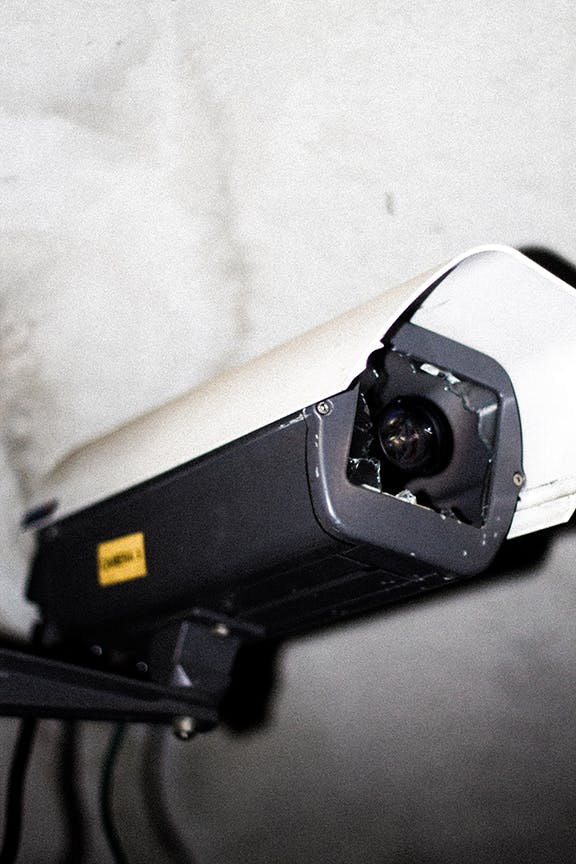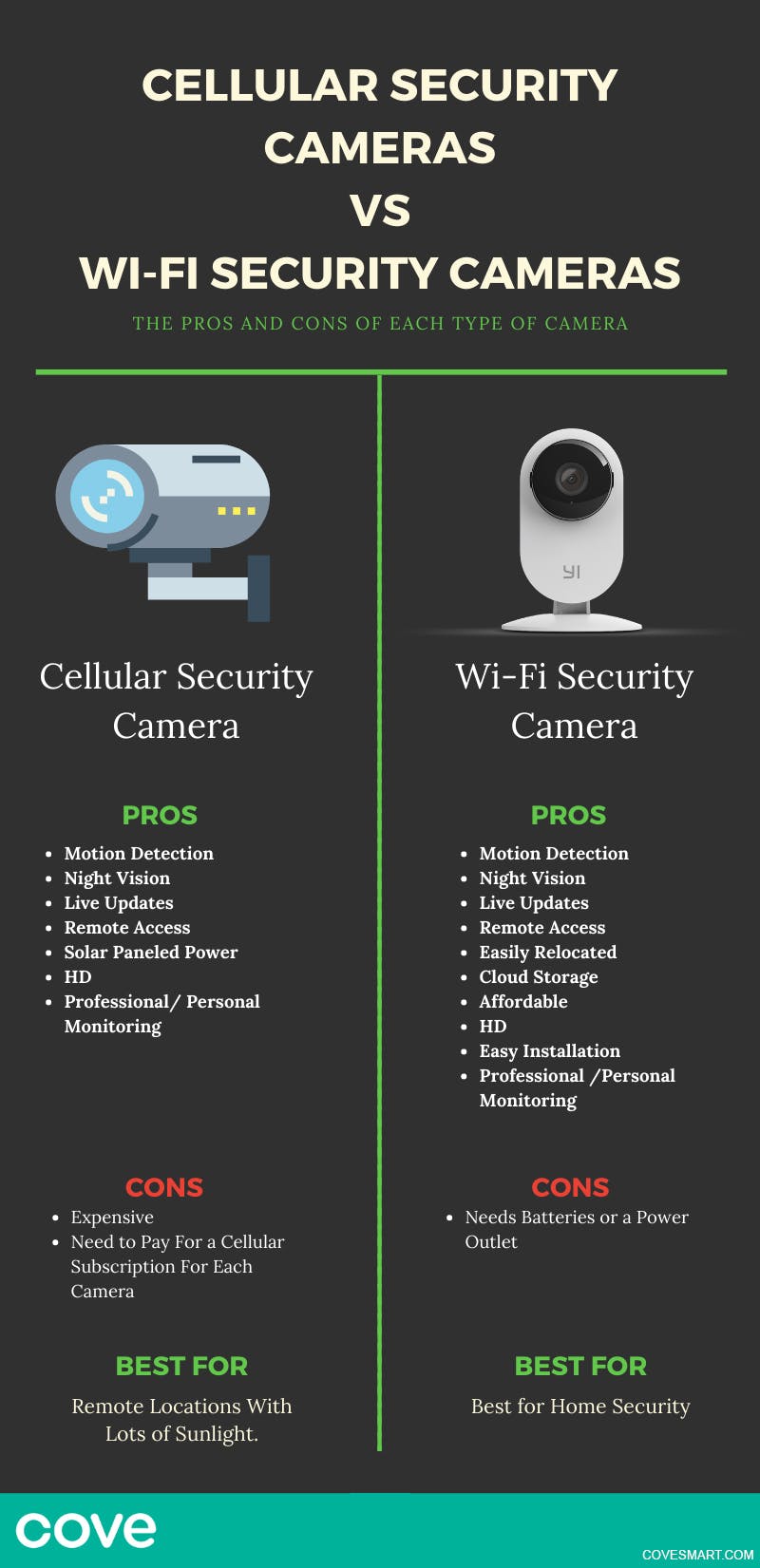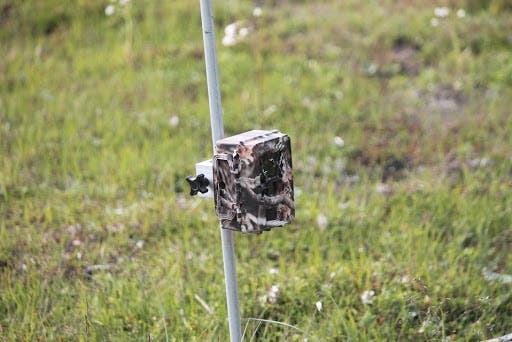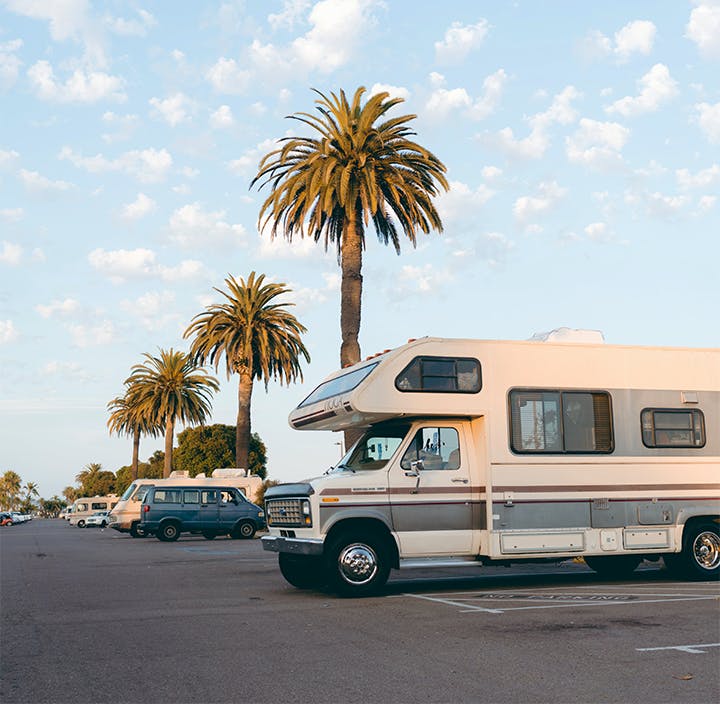
When it comes to a surveillance camera, having a camera that can be controlled with your smartphone sounds pretty great, right? With so many options out there, what’s the right one to choose for home security? Before you make a purchase, it’s important to know what you’re buying and what it will be best used for.
The Tea on Wireless Security Cameras
Before wireless security cameras, homeowners had to rely on wired systems if they desired any kind of home security protection. Wired systems present hassles that most homeowners want to avoid. Think messy wires, high installation costs, and clunky equipment.
Fast forward to now and we can wirelessly control, store, and transmit the data of home security systems. Of course, as with all wireless technology products, there are a few ways to achieve the desired outcome. Here we’ll talk about your two main options: a cellular security camera or a WiFi-enabled security camera. Keep reading to learn the pros and cons of both and understand which wireless security cameras are your best bet.

The Difference Between Cellular Cameras And WiFi-Enabled Cameras
Cellular security cameras and wireless (or WiFi-enabled) security cameras are NOT the same and neither are their use cases. While both cameras are, in fact, wireless, they function quite differently.
WiFi-enabled cameras use a wireless internet connection to connect to a smartphone app. The app allows homeowners to have access to live streaming, two-way audio, and other smart features so long as that WiFi connection exists.
Cellular cameras are more similar in function to a cell phone, using a 3G/4G/5G cellular network connection instead of an Internet connection. Requiring a cellular data plan, the camera is paired to a security panel with a cellular node. Like a cell phone, the panel is able to send messages and notifications across a mobile network to home security monitoring stations. Depending on your needs and environment, a cellular camera can actually be a solar-powered security camera, using solar panels instead of batteries. When it comes to a cellular camera homeowners can contact their cellular provider for cellular backup or insert an SD card for additional storage.
By using a cellular network instead of WiFi, the cameras can be used away from home. Cameras that use WiFi are tethered to a WiFi network, often limiting their placement when needed outside the home or around a property. Because these surveillance cameras use cellular data instead of a WiFi network, the cameras can be used as driveway cameras, trail cameras, and for many other outdoor security needs.
There are some additional benefits to using a cellular security camera. Here are a few to pay attention to:
1. Cellular Cameras Use a Cellular Network Instead Of WiFi
The cellular camera is completely wireless and relies on either batteries or solar panels. Because the camera is wireless, homeowners don’t have to worry about the mess and hassle of hiding wires. The wireless feature also makes these surveillance cameras user-friendly and easy to install, plus homeowners can contact their cellular provider for cellular backup or use an SD card for added storage.

2. Cellular Cameras are Very Easy to Setup
Again, with a completely wireless system, there are no wires, making it less of a hassle for homeowners. Cellular surveillance cameras don’t require professional installation and can be set up from the comfort of your own home in just a few easy steps. Simply insert a SIM card into the camera, download the camera’s smartphone app, and place the camera where you want it.
Unlike a wireless camera, the cellular camera does require an additional step to set up a cellular network. However, if you need to use a security camera in an area that doesn’t have WiFi, the cellular camera is going to be your best option.
3. Cellular Cameras Have Great Surveillance Features
Cellular cameras are meant to provide automatic security remotely. To better ensure the quality of the camera footage, the cameras are installed with a wide-angle lens. The wide-angle feature allows the camera to see more, ensuring that the homeowner has complete control over their property surveillance. Wide-angle cameras are commonly used for wireless security systems because they provide better protection. Other cameras only provide a 90-degree view, limiting the recording angles of the camera. To fully protect your property, it’s important that your camera offer more full-range recording angles.
In addition to having a wide-angle lens, the camera also comes equipped with motion detection and night vision for more secure protection. Cellular cameras are fully stocked with features that make them the perfect camera for remote security.

4. Cellular Surveillance Cameras Offer Remote Viewing From A Smartphone
Although the camera is independent, you can use cellular cameras as surveillance cameras by logging into the camera’s smartphone app. The app allows homeowners to access live video footage at any time. We call this “remote viewing,” which essentially allows homeowners to watch the camera footage from anywhere.
This feature is a great security feature that is often included with wireless security cameras. However, because the cellular camera relies on a cellular network, homeowners will need to pay more for a cellular data plan that is compatible with their needs.
5. Cellular Cameras are Great Trail Cameras
Since the cellular camera is completely wireless, this surveillance camera is a great option if you’re looking for a trail camera. Trail cameras are often used for watching wildlife in their natural habitat (either for hunters, photographers, and hobbyists alike). Hunters use trail cameras to keep an eye on the tendencies and habits of animals. Trail cameras help hunters to know when herds have migrated to salt licks or when they head to nearby streams. Since animals often develop behavior patterns, trail cameras can help hunters to establish when and where game animals will be hanging out.
Cellular cameras can also be used for photographers and nature lovers. Wildlife photographers can set up cellular cameras near bird’s nests, rivers, and other locations to watch wildlife in their natural habitats, without worrying about interfering with nature. When using a solar panel to power the cellular camera, the camera can be left rolling for months watching and recording wildlife activity. With the right data plan, photographers will be able to stream live footage from the camera. Not to mention that most cameras come equipped with night vision, motion detection, and cloud storage so that you can capture and save all the greatest moments.

When to Use a Cellular Camera
When it comes to home security, it’s important to point out that a cellular camera is likely not your best bet. Cellular cameras are specifically designed to provide monitoring services in areas that only have access to cellular networks and not WiFi. As mentioned previously, it’s great for nature lovers and wildlife enthusiasts. When connected to a solar panel, you can get quality footage of animals, wildlife, or your remote cabin or farm. The data is collected remotely right from your mobile device. Here’s a deeper look at the best use cases for an independent camera such as this:
1. Hunting and Wildlife Photography
Since the camera is completely wireless, the cellular camera works great when used as an outdoor security camera or trail camera for hunting and wildlife photography. Again, trail cameras are used by hunters and wildlife enthusiasts to capture wildlife in their natural environment and to keep an eye on animal routines, habits, and behavior. This helps to better establish where those game animals can be found.
If hunting is not your jam, cellular cameras can also be used to capture wildlife images. Wildlife photographers can set up cellular cameras near bird’s nests, rivers, and other locations to watch wildlife in their natural habitats without interfering with nature. When using a solar panel to power the cellular camera, the camera can be left for months to record wildlife activity. Also, most cellular cameras come equipped with great surveillence features such as night vision, motion detection, and cloud storage to ensure that you never miss a beat. With the right data plan, photographers will be able to stream live footage right from the camera.
2. Boats and Docks
A wired system on a boat is usually impractical. Since the cameras are wireless and do not require a WiFi connection, they can be installed in a variety of places on the boat or dock. Additionally, dock owners can completely avoid camera maintenance by using a cellular camera with a solar panel.

3. RV Security and Campsites
Similar to boats and docks, RV’s and campsites may not have access to WiFi which makes the cellular camera the better option. This camera system will be able to protect the RV from break-ins while still providing owners with easy, convenient, and hassle-free security.
4. Barns and Ranches
Whether you want to prevent strangers from sleeping in your barn or stop foxes from antagonizing chicken and turkeys, cellular cameras will get the job done. Remote barns and ranches can have the benefit of full protection without having to worry about wires, batteries, or an Internet connection.
When a cellular Camera May Not be Your Best Bet
We’ve discussed the best use cases for a cellular camera. They work great in remote locations, offer hassle-free setup without the use of messy wires, and are a great option for hunters, photographers, and outdoor enthusiasts looking to record wildlife on a trail camera. There’s no doubt that a cellular camera has some great features when it comes to surveillance, however, it’s not your best option when it comes to home security. Here’s a deeper dive into why you may want to reconsider your decision to purchase a cellular camera – especially if you’re looking for a home security solution.
1. Cellular Cameras are not Equipped with Professional Monitoring
Cellular cameras are not the best choice for simple home security. One of the most important features of a home security system is the ability to alert emergency responders of your emergency. When it comes to a cellular camera, usually the only way to monitor is via your mobile smartphone app instead of 24/7 professional monitoring. That means that in the event of an emergency, you’ll be able to see the emergency but emergency responders will not know about it until you call them. This lack of professional monitoring may leave you and your home vulnerable. It certainly doesn’t provide the peace of mind that is expected from a home security system.

2. Cellular Security Cameras are Expensive
Cellular cameras are significantly more expensive than wireless camera systems. There are two main factors that make cellular cameras more expensive than wireless cameras: cellular data and remote technology. Of course, since you will have to buy a separate data package for your cellular camera, the data package means you’re tacking on an additional monthly fee. And if you have multiple cellular cameras, the cost keeps climbing. Also, we mentioned that cellular cameras have the ability to connect to solar panels (which are extremely expensive) and are meant to be completely weatherproof. Due to the durability of the cameras, they can be nearly triple the cost of a regular wireless camera.
3. Don’t Expect Great Battery Life
The cellular camera is streaming live footage through a cellular network, which means that the battery life is extremely short. When solar panels aren’t an option due to geography or environment, you should expect to replace the batteries of a cellular security camera weekly. When it comes to home security, it is very difficult to depend on technology that lacks the battery life to truly provide you with protection and peace of mind.
4. Cellular cameras can have poor video quality.
Since the cameras rely solely on a cellular network, the streaming video quality will be dependent on that cellular connection. It will also be impacted by weather and other environmental factors. Due to inconsistencies in video quality, cellular cameras are not recommended for those who are looking for consistent video footage and quality. Instead, those looking for consistent quality should defer to wired or wireless video cameras.
5. Cellular Cameras can be Hacked
Like all technology, cellular security cameras can be easy targets for hackers, significantly compromising their security benefits. Although the lack of Internet connection makes it more difficult, it’s still a possibility if the hacker were able to access the camera directly. Since most cameras are used in remote locations, it’s possible to get close enough to the camera to alter the setting before the hacker is caught. To prevent hacking, homeowners will need to pay close attention to the camera and respond immediately if they suspect a threat.

The Best Home Security Camera
When it comes to protecting your home, your best option is going to be a wireless security camera or WiFi-enabled security camera. These cameras are designed to provide total home protection and can work in conjunction with a home security system. It’s a great option if you want to go the extra mile to keep yourself, your family, and your home safe.
As mentioned, instead of relying on a cellular network, wireless camera systems connect to a Wi-Fi network. That also means that it’s more reliable, more cost-effective, with a much longer battery life. Through the Wi-Fi connection, a wireless security camera can partner with your security system to protect your home from the front door to the back door.
A fantastic wireless camera option is the YI camera from Cove. Cove offers total home security and this WiFi-enabled security camera provides two-way communication, remote access, HD resolution, night vision, and motion detection. This easy, DIY design can be set up hassle-free and is compatible with most smart home systems.
Why Choose Cove Home Security?
One of the best security systems for homeowners is Cove home security. Cove offers fully-equipped security systems that include motion sensors, door and window alarms, indoor security cameras, and more. This professional-grade, quality equipment is combined with 24/7 professional monitoring for 24/7 peace of mind. The Cove DIY home security system is also cost-effective at only $15/month. It’s the most affordable security system on the market. Lastly, Cove boasts an easy DIY set up with step-by-step instructions and top-notch customer support. It’s hands down your best option.
